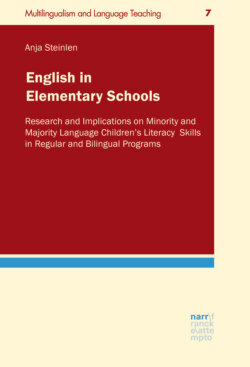Читать книгу English in Elementary Schools - Anja Steinlen - Страница 18
На сайте Литреса книга снята с продажи.
2.2.4 Studies on FL reading in regular EFL programs
ОглавлениеIn empirical research, an increasing number of studies have examined the influence of written language on foreign language learning in elementary schools in Germany, but the focus has been more on reading (comprehension) than on writing. These studies have been largely conducted in only one Federal State of Germany (e.g., EVENING for Nordrhine-Westfalia, or Rymarczyk, 2011; Steinlen & Piske, 2018 for Baden-Württemberg), with the exception of the BIG-Kreis (2015), which assessed students’ FL competence in different Federal States. Unfortunately, many findings were not related to the Common European Framework of Reference (CEFR, Council of Europe, 2001, 2018) and/or statistically analysed.
The EVENING study (Evaluation Englisch in der Grundschule) was conducted with around 1,300 fourth grade classes in Nordrhine-Westfalia (NRW, Engel, Groot-Wilken & Thürmann, 2009), who had attended regular FL lessons since the beginning of grade 3. The reading test consisted of 25 multiple-choice and matching tasks, which were specifically designed for the project, and assessed reading skills with regard to the children’s world knowledge, lexical knowledge and knowledge of chunks and phrasal verbs. In total, the children solved 66.8% of all tasks. These results were better than expected, because English in its written form had only played a subordinate role in the curriculum in NRW at that time (2005-2007). This was also reflected in the low amount of reading activities carried out in the 88 hours of EFL lessons (Wilden et al., 2013).
Elementary schoolers’ English skills in reading, writing, listening, and speaking were evaluated in the BIG-study with a sample of 2,148 fourth grade students from different Federal States of Germany (BIG-Kreis, 2015), using test material from the EVENING study. The 17 items on English reading comprehension included multiple choice tasks and tasks on reordering sentences to match pictures. On average, students answered 14 items correctly, corresponding to 82.4%. However, the authors pointed out that the tasks may have been too easy, because the fourth graders in the BIG-study obtained scores on the reading comprehension tasks that were more than 15% higher than those scores reported in the EVENING study (Engel et al., 2009).
Smaller-scale studies on English reading skills in regular English classrooms in Germany include Rymarczyk (2011) and Steinlen & Piske (2018a). Rymarczyk (2011) examined English reading comprehension skills of 48 first- and third-graders in the FL classroom, reporting that even weaker learners, when confronted with English writing in the classroom, showed significant learning gains in reading. Due to the incongruent phoneme-grapheme relationship in English, the children in Rymarczyk’s study achieved better results on the silent-reading, word-picture matching task than on the reading-aloud task. Based on these results, Rymarczyk (2011) argued for the inclusion of written language in the first two elementary school years, as doing so may also present additional learning opportunities for weaker students (see also Wilden et al., 2013 and chapter 7.1).
Steinlen & Piske (2018a) examined English reading comprehension skills of 73 students at the end of grade 4 who had attended a FL program since first grade. Using the subtests for reading from the Primary School Assessment Kit (PSAK, Little, Simpson & Catibusic, 2003), they found these children to perform in-between levels A1 and A2 regarding their English reading comprehension skills. Thus, the outcome for English reading exceeded the target level of A1 (KMK, 2013a). The authors argued that these results were possibly due to two factors. Apart from the children’s background (i.e., having age-appropriate cognitive abilities and coming from middle-class families), the high quality of the English lessons in the FL program may have been the decisive factor, since the teachers in the FL program hold university degrees in teaching English-as-a-subject rather than teaching “fachfremd” (i.e., without any qualification for this subject which may negatively affect students’ performance, see also Fleckenstein et al., 2020).
